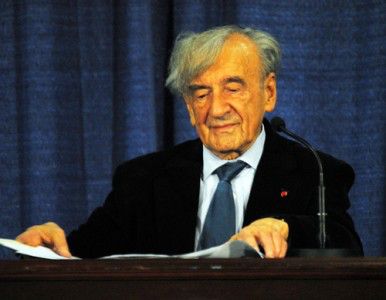
“Good questions have no answers,” said Nobel Laureate and Boston University professor Elie Wiesel in the last lecture of his annual three-part series.
More than 1,000 people attended the lecture, held in Metcalf Hall on Monday at 7 p.m.
“In spite of everything, I still believe that people are really good at heart,” said Rabbi and Hillel House director Joseph Polak, quoting Anne Frank as he introduced Wiesel. “I simply can’t build up my hopes on a foundation consisting of confusion, misery and death.”
Wiesel began his lecture about good and evil by telling the story of Adam and Eve, in which Adam and Eve defied the orders of God and tasted the fruit of the tree of knowledge of good and evil.
Posing several questions about God, morality, sin and responsibility, Wiesel questioned the roots of evil, whether it is everlasting and how it disguises itself as good.
“I believe that evil is not in my relationship to God. Evil is my relationship to another person,” he said, continuing to speak about the fascist movements of Hitler and Mussolini, which were fraught with evil relationships.
“Throughout the centuries, to many people, evil appears to be more exciting,” Wiesel said. “[It appears to be] more interesting, more creative and even more productive. “
At one point, Wiesel referred to the Occupy movement. While he said he considered the cause noble, he said the movement’s members do not appear to consider the implications of their movement’s name.
“Don’t they know what ‘occupation’ really meant to generations before?”
Wiesel concluded his lecture about questions of good versus evil, saying the “answer is always in our hands.”
After the lecture, Wiesel answered students’ questions at the Hillel House, where he spoke about the Israeli-Palestinian conflict and gave advice to the students.
The turnout for the question and answer session was the biggest in BU history, Polak said.
Wiesel, who recently underwent open-heart surgery with five bypasses, stopped teaching upon doctor’s orders. Nonetheless, the author said he remains committed to his annual three-part lecture series.
“If I feel better next year, I hope I can come back to teaching because I love it. It’s really my passion,” he said.
Students who attended Wiesel’s lecture said they were inspired by his speech on good and evil.
“This is my first time seeing Elie Wiesel,” said Micaela Brody, a junior in the College of Fine Arts. “My confirmation paper was on ‘Night,’ which was obviously his book, so seeing him in general was really meaningful to me.”
Andrew Caplan, a freshman in the College of Communication, said he enjoyed hearing the words of one of the few living Holocaust survivors.
“My family and friends are so jealous that I go to Boston University because I have the honor of listening to such a wise, thoughtful, and determined man for the next four years,” Caplan said.
This is an account occasionally used by the Daily Free Press editors to post archived posts from previous iterations of the site or otherwise for special circumstance publications. See authorship info on the byline at the top of the page.




Good is simple. Evil is always complicated. -MKate
Saint Augustine couldn’t do it. But can someone else explain what kind of fruit Adam and Eve ate in the story? After thousands of years it’s time to think, read, and give the real explanation based only on the facts in the story. No guesses, opinions, or beliefs. We’ve already had way too many of these. Treat the whole thing as a challenge. But first, do a quick Google search: First Scandal.
A long time ago Elie Wiesel spoke about Adam and Eve
at Temple Sinai. He related that Adam and Eve ate the
apple and God was angered… upon being angered God
asked Adam about the apple incident- so Adam made up
a story…if God had asked Eve..
Eve would have told the truth.